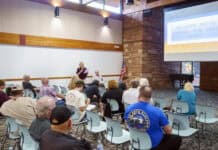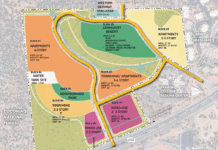The lights are back on — at least to Sedona City Council’s agenda.
On Tuesday, June 24, City Council approved 7-0 to reopen a motion it passed June 10 regarding safety issues on Highway 89A, although time may no longer be on the city’s side.
Larson Newspapers
The lights are back on — at least to Sedona City Council’s agenda.
On Tuesday, June 24, City Council approved 7-0 to reopen a motion it passed June 10 regarding safety issues on Highway 89A, although time may no longer be on the city’s side.
On June 10, council voted 5-2 to adopt six short-term options and install a traffic signal at Andante Drive, as recommended by the Highway 89A Pedes-trian Safety Committee.
Council moved to incorporate the remaining long-term options, including medians or barriers, in to Sedona’s Long Range Plan.
After the June 10 meeting, Councilman Dan Surber, who voted in the majority, asked for a reconsideration, which was granted at the June 24 meeting.
There were too many unanswered questions at the earlier meeting, Surber said. He was concerned with the long-term solutions, like continuous medians, that would be installed in the future as part of the city’s redevelopment plan.
“There are many stakeholders involved,” he said. “In the end, we’re not positive it’s going to be supported or implemented.”
Once council agreed to reopen the issue, City Manager Eric Levitt requested the action be put on the Tuesday, July 22, agenda to give the Arizona Department of Transportation more time to come back with answers. He also hinted that ultimately, since Highway 89A is a state road, ADOT has the liability, and it may not wait forever.
By not giving ADOT time to consult and come back with an answer, somehow City Council has created a standoff with ADOT, Councilman Cliff Hamilton said.
“Maybe part of the trouble is that they feel they’ve been having this discussion for over a year. They feel they need to move at some point,” Levitt said. “I don’t know if they’re in a position to be able to wait. It’s hard for them to wait indefinitely when they have certain liability and safety regulations.”
Since Highway 89A is considered one of the five most dangerous highways in the state, ADOT may have to make a decision, according to Levitt.
Although ADOT doesn’t need the city’s recommendation to make changes to its own highway, Hamilton wondered if ADOT would really start work without any public input.
“Do you think they’re going to start steamrolling the city?” he asked.
“I don’t think they’re bulldozing anything,” Levitt said. “They’ve had a couple of years of discussions with the city on this issue.”
Plus, ADOT has a lot of constraints that the city doesn’t have to deal with.
“I think they’re trying to work really hard with the city. They’re trying to figure out what they can come up with that they can live with and we can live with,” he said.
On that note, Councilman Ramon Gomez asked what liability the city would have if someone were killed on Highway 89A now, before council can approve recommendations for ADOT.
In the past, before any discussions began, the city was sued along with ADOT for the deaths that occurred on the highway, City Attorney Mike Goimarac said.
Although the city is acting in good faith to come up with a solution for the highway, that’s not to say a plaintiff wouldn’t try to hold the city accountable, Goimarac said.
“It would be the city’s
position that ADOT has sole responsibility. … So how does that filter in to what we’re doing here? Your guess is as good as mine,” he said.
But it does give ammunition for someone to use against the city, he admitted.
In any case, the issue council will reconsider is input ADOT asked for on a road that ADOT is responsible for, Levitt said, so there may come a day when ADOT says, “OK, we’re done asking for your input. We’re going to do what we want.”
According to Levitt, who speaks with ADOT daily, that day is close.
Before making any more decisions, Councilman Marc Sterling asked to get ADOT’s proposal in writing, with costs and time lines included.
“We have so many questions. There’s so much left unanswered. Reconsideration is critical,” Gomez said. “We need that information. We need to understand what we’re doing.”
Alison Ecklund can be reached at 282-7795, Ext. 125, or e-mail
aecklund@larsonnewspapers.com





















